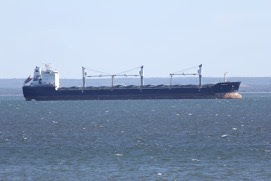 |
| calm but gloomy Lake Superior in Summer
Photo by J. Harrington
|
Somehow, over the past few years, we seem to have missed the notice that Gordon Lightfoot revised one of the lines in the lyrics when he performed live versions of "Wreck." The changes are attributed to a 2010 report in the Toronto Star which, in turn, was based on a television documentary.
"In a documentary by a Toronto film company that debuted earlier this year on History Television, a father-and-son diving team suggests the ship was in fact sunk by a rogue wave _ a massive wall of water that can reach up to 10 storeys high but was previously dismissed as a sailors' myth." [NOTE: one storey is about 10 feet, making such a wave a 100 footer]The details of The Storm That Sunk the Edmund Fitzgerald are described on a page at the University of Michigan Sea Grant's site. The original National Transportation Safety Board's report, issued in 1978, found "The National Transportation Safety Board determines that the probable cause of this accident was the sudden massive flooding of the cargo hold due to the collapse of one or more hatch covers."
 |
| small Summer whitecaps, large ship on Superior
Photo by J. Harrington
|
Even if one or more of the 29 crew members, all of whom perished when the ship sunk, had survived, it's not clear that the real reason for the sinking would be less of a mystery. We don't have any problems envisioning a "rogue wave" contributing to the collapse of hatch covers and other conditions that that led to
"And later that night when 'is lights went outta sightEach time you leave those you love, be sure to hug them and tell them that you love them. Remember, whatever the cause of the sinking:
came the wreck of the Edmund Fitzgerald."
"The searchers all say they'd have made Whitefish BayAt a minimum, please honor those lost with a minute of silence tomorrow, for them and others lost due to Great Lakes weather. Cindy Hunter Morgan has a very recently published book of poems, Harborless, inspired by shipwrecks of the Great Lakes. Here's a sample:
if they'd put fifteen more miles behind 'er.
They might have split up or they might have capsized;
they may have broke deep and took water.
And all that remains is the faces and the names
of the wives and the sons and the daughters."
PHILDELPHIA, 1893
Lake Huron
The ship sank with a load
of cast-iron stoves, which tumbled,
lopsided, through white foam,
green water, teal water, water
as dark as coal, then darker.
From deck to lake floor,
they dropped 200 feet,
plummeting past the white faces
of lost men, who stared, gaping.
One man, hit by a stove, grasping
for something, swung his legs around the belly
of another stove singing beside him
and rode it to the bottom.
When it settled in silt,
he slipped off—an arm floating across his forehead—
and slumped, exhausted, near the hearth:
wreck of a boy in November
done with chores.
********************************************
Thanks for visiting. Come again when you can.
Please be kind to each other while you can.
No comments:
Post a Comment